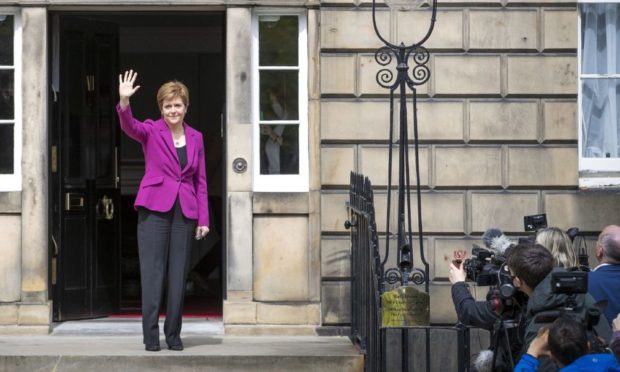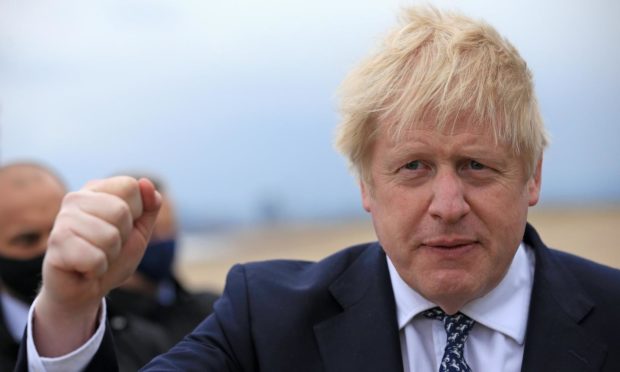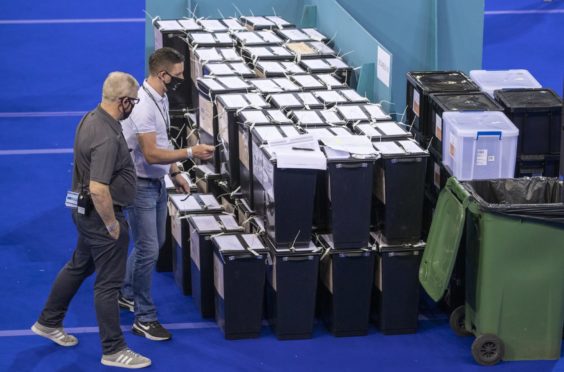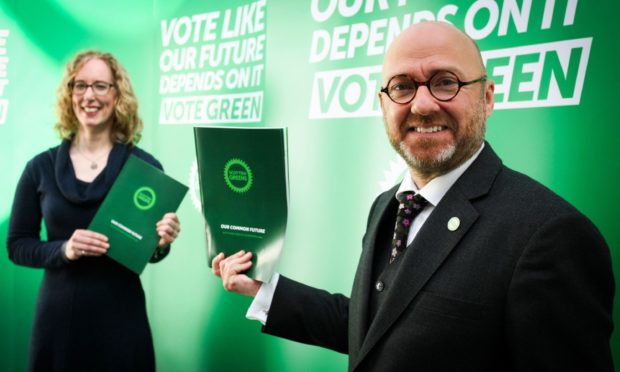Nicola Sturgeon has warned Prime Minister Boris Johnson a second independence referendum is now a matter of “when not if”.
The SNP leader used her first phone call with Johnson since Thursday’s vote to reiterate her intention to hold another vote on Scotland’s future this parliamentary term.
Ms Sturgeon led her party to a convincing victory in the Scottish Parliament election, putting the SNP in government in Scotland for a fourth time with a record 48% of the constituency vote and an extra MSP – but the party fell just one seat short of an outright majority in Holyrood.
IndyRef2 stand-off
It sets the scene for a continued stand-off between Edinburgh and London as senior Scottish Tories claiming it is the “settled will” of the Scottish people to stay part of the UK, and the Chancellor of the Duchy of Lancaster Michael Gove insisting there is no immediate prospect of another vote.
“We’re not going to go down the route of talking about independence or legal challenges or anything like that when our principal focus, our exclusive attention, is going on pandemic recovery,” Aberdeen-born Mr Gove told the BBC on Sunday.
The First Minister meanwhile said it is important to give the people of Scotland the chance to decide its own future, but added the time for a referendum is not now.
‘It is up to the Scottish people’
She told the BBC’s Andrew Marr: “It is not, and shouldn’t be in a democracy, a controversial argument.
“Michael Gove is against Scottish independence, but it shouldn’t be up to him or I to decide – it is up to the Scottish people who voted overwhelmingly for the SNP.
“Firstly we need to steer the country though the pandemic but after the crisis we need to give the people of Scotland the opportunity to choose their own future.”
The Prime Minister previously said he is prepared to take the SNP to the Supreme Court to stop the party from holding a second independence referendum.
Responding, Ms Sturgeon said: “I think it would be absurd and outrageous if it ever got to that point because for this to end up in court it would mean the Conservative government refused to respect the democratic wish of the Scottish people and is trying to go to the Supreme Court to overturn Scottish democracy, which would not play well.
Election result leaves political playing field largely unchanged
After two days of vote tallying on Friday and Saturday, a change to late night traditions forced by the coronavirus pandemic, the results leave parliament with a pro-independence majority but not much change to the overall picture.
While the SNP picked up one seat and now have 64 MSPs, the Scottish Conservatives, under leader Douglas Ross, ended up with 31 MSPs – the same as before the election.
Scottish Labour dropped back two seats, losing one in the Highlands, but held on in what had been the tightest contest in the country.
The Greens made big advances to add two to their tally in regions, including the North East. They now have eight MSPs – twice as many as the Scottish Liberal Democrats who dropped from five to just four MSPs.
The results show there were two particular failures on both wings of the unionist and independence movements.
Alex Salmond, the former First Minister, saw his new Alba party fail to make an impression big enough to get in on the regional lists. He did not cut through in his own North East patch.
At the other end of the constitutional spectrum, another former heavyweight – George Galloway – suffered electoral oblivion for what he hoped would be a unionist alliance.
What do the results mean for the new parliament?
First Minister Nicola Sturgeon immediately pointed to the pro-independence majority in a challenge to Prime Minister Boris Johnson.
But the Conservatives insist the unionist bloc and lack of consistent majority support in opinion polls for independence demonstrates a lack of appetite for leaving the UK.
The pandemic, economic and environmental recovery remains the focus, according to party leaders.
Could an SNP-Green coalition be on the cards?
Scottish Greens co-leader Lorna Slater says it is up to the SNP to decide whether or not they will form a coalition with her party in the Scottish Parliament, with first minister Nicola Sturgeon “open minded” on the subject.
The newly-elected MSP said the her party will have much more influence in Holyrood during this parliamentary term, after the party upped its total from six to eight.
Slater said: “I am delighted to win – this is the largest Green group in parliament we have ever had, and having more Green women than ever before has got to be good.
“I think it gives us significantly more influence.
“Given the SNP has a minority they will need to work with another party, and last time they worked with us.
“But of course when they worked with us we pushed for them to be more progressive, fairer and greener and we hope to play that role this time.
Ms Slater confirms the have been no official approached to her party by the SNP to hold coalition-building talks, but on Sunday her co-leader Patrick Harvie said he thinks a lot of party members would be willing for the Greens to discuss the prospect of a coalition with the SNP, but added there would be challenges around policies such as tax, oil and gas, and transport.
First Minister Nicola Sturgeon said the SNP can work with the Greens on some issues, and said she was “open minded” to have discussions with the Scottish Greens.



